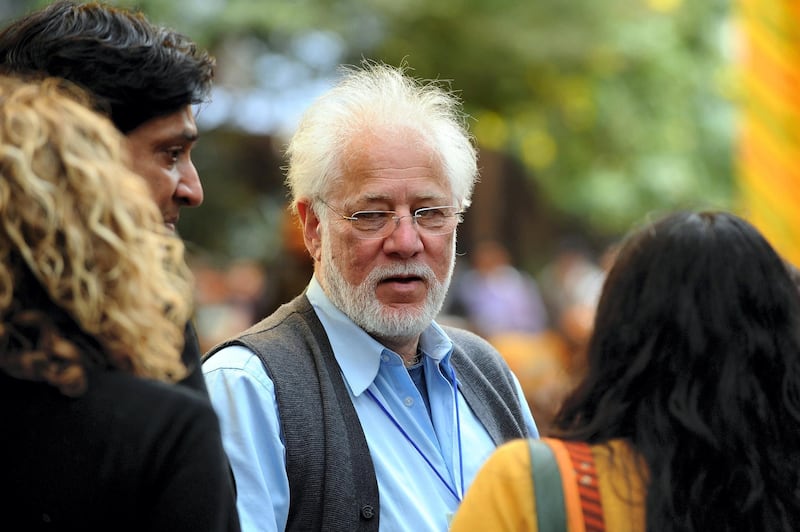Michael Ondaatje's seventh novel, and his first in as many years, comes with a striking yet perplexing title that makes sense and acquires significance only after 75 pages.
This isn't the first time the Sri Lankan-born author has teased with a title and made his reader wait for clarification. Divisadero (2007), we come to learn, is named after a street which has as its source two very different Spanish words. The Cat's Table (2011), we discover, refers to "the least privileged place" to dine on an ocean liner. Then there are the titles that promise one thing but deliver another: Anil's Ghost (2000) contains no apparition; and the eponymous character in Ondaatje's most famous novel, The English Patient (1992), isn't English.
That latest title, Warlight, remains an enigma for a while. Eventually, though, it explains itself during a scene in which the book's narrator describes one of the many nocturnal journeys he made along the Thames in 1945: "We passed industrial buildings, their lights muted, faint as stars, as if we were in a time capsule of the war years when blackouts and curfews had been in effect, when there was just warlight and only blind barges were allowed to move along this stretch of river."
It turns out to be a fitting title, for this is a dimly lit novel filled with shadowy people pursuing personal hidden agendas or carrying out dark or vaguely defined duties for murky organisations. Ondaatje’s deftly controlled chiaroscuro creates suspense, intrigue and a queasy atmosphere of uncertainty, and keeps the reader guessing as to his characters’ real identities and true motives.
The book begins in London at the end of the Second World War. Fourteen-year-old Nathaniel and his older sister Rachel are apparently abandoned by their parents and left in the care of their third-floor lodger, a man they call “The Moth”. Both siblings have their doubts about him: he may have worked with their mother in some clandestine capacity during the war but now, in peacetime, he is a criminal who steals from art galleries, disappears for days, and fills their home with colourful guests.
When Nathaniel and Rachel run away from boarding school, their new protector makes alternative arrangements for them. Nathaniel gets his first taste of work in the “grey universe” of a hotel basement, and then progresses to helping out his other proxy parent, The Darter, on his greyhound-smuggling expeditions. He also gets his first taste of love, spending time and seeking refuge with Agnes in a series of abandoned houses, or “skeletal homes”.
A violent showdown brings this stage of Nathaniel’s life to an abrupt end. From here, Ondaatje jumps to 1959, glossing over some “wilderness” years. Nathaniel now works for British intelligence, where his responsibilities involve reviewing files covering the war and its aftermath. With classified archives at his disposal, he decides to trace his mother’s life. He embarks on a new journey, uncovering the details surrounding her top secret war-work, her loves, and, ultimately, her death.
As with Ondaatje's previous novels, Warlight examines the effects of physical and emotional breakdowns and upheavals, either on those who endured them or on later lives. Like The English Patient in particular, it is elegantly written, intricately layered, and skilfully – though at times also frustratingly – told out of sequence. When Nathaniel says that "the chronology of events has fallen apart, for whatever defensive reason" we can't help but agree. His attempts to join the dots and fill in the blanks of his mother's life and career prove absorbing, even thrilling, but in places Ondaatje loses his way with episodic fragments and jerky hither-and-thither time shifts.
Many characters captivate, especially Nathaniel’s various “guardian owls”. Others aren’t afforded the chance. At one point Ondaatje brings in Olive Lawrence, an ethnographer and one of The Darter’s lady friends. He devotes 10 consecutive pages to her, describing who she is and how she ticks – after which she leaves London and with it, Nathaniel’s life, returning only as a hazy memory.
For the first part of the book Nathaniel's mother Rose is also a hazy memory. She is similar to that other absent mother in Divisadero whose unaired thoughts, we are told, remain at "an unquestioned distance".
Nathaniel refuses to be silenced by such distance, and when he starts probing into Rose’s secret life – “this unknown and unspoken world” – he is given a fresh purpose and the novel is given a new direction.
Not that it needed one. That first section comprising Nathaniel’s youthful adventures is by far the strongest. We follow a boy from “a family of disguises” in a time of confusion making his way through a derelict, devastated city full of “war ghosts”.
The shady people he encounters may or may not be who they say they are. His night missions on a mussel boat on the Thames are gripping and his blossoming romance with Agnes affecting. There is mystery, mayhem and frequent hints of danger, but for Nathaniel his eventful days and hazardous nights offer “wondrous doors into the world.”
In Anil's Ghost, Ondaatje notes that "secrets turn powerless in the open air". The reverse is the case in Warlight. It may not be his most streamlined novel but it is held together by the potency of his revelations and the seductive beauty of his prose.
______________________________
Read more:
Book review: Ben White's Cracks in the Wall looks at Israel in isolation
Review: 'Divided: Why We're Living in an Age of Walls' by Tim Marshall
Book review: Donald Macintyre shares story of how life still goes on in Gaza amid the shellings
______________________________










